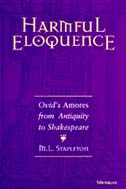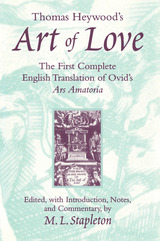2 books about Stapleton, Michael L.

Harmful Eloquence
Ovid's Amores from Antiquity to Shakespeare
M. L. Stapleton
University of Michigan Press, 1996
M. L . Stapleton's Harmful Eloquence: Ovid's "Amores" from Antiquity to Shakespeare traces the influence of the early elegiac poetry of Ovid (43 b.c.e.-17 c.e.) on European literature from 500-1600 c.e. The Amores served as a classical model for love poetry in the Middle Ages and the Renaissance and were essential to the formation of fin' Amors, or "courtly love." Medieval Latin poets, the troubadours, Dante, Petrarch, and Shakespeare were all familiar with Ovid in his various forms, and all depended greatly upon his Amores in composing their cansos, canzoniere, and sonnets.
Harmful Eloquence begins with a detailed analysis of the Amores themselves and their artistic unity. It moves on to explain the fragmentary transmission of the Amores in the "Latin Anthology" and the cohesion of the fragments into the conventions of Medieval Latin and troubadour "courtly love" poetry. Two subsequent chapters explain the use of the Amores, their narrator, and the conventions of "courtly love" in the poetry of both Dante and Petrarch. The final chapter concentrates on Shakespeare's reprocessing and parody of this material in his sonnets.
Harmful Eloquence analyzes the intertextual transmission of the Amores in major medieval and Renaissance love poetry for the first time. No previous study has devoted itself exclusively to this Ovidian text in this particular way. The premise that Ovid consciously used the device of persona from the very beginning of his writing career is fully explored, as is the "Ovidian hypothesis" of Wilibald Schroetter. Connections between Dante's La vita nuova and the Amores are newly discovered; significant for Shakespeare studies, the use of Christopher Marlowe's translation of the Amores by Shakespeare in his "dark lady" sonnets is also carefully analyzed for the first time.
Medievalists, classicists, and scholars of Renaissance studies will find Harmful Eloquence particularly engaging and useful, as will all those interested in the process and methods of literary transmission.
M. L. Stapleton is Associate Professor of English, Stephen F. Austin University.
[more]

Thomas Heywood's Art of Love
The First Complete English Translation of Ovid's Ars Amatoria
Edited, with Introduction, Notes, and Commentary by M. L. Stapleton
University of Michigan Press, 2000
Thomas Heywood (ca 1573-1641) was a major Renaissance playwright who wrote or collaborated on over two hundred plays. Loues Schoole was one of his many nondramatic works that shows his fascination with antiquity. It was the standard English translation of the Ars in the seventeenth century, so popular that it was pirated almost as soon as he had written it--then printed, sold, reprinted, and resold in England and the Netherlands. It was not attributed to him during his lifetime, and he was not allowed to share in the profits that its (considerable) sales generated, two things that rankled him for the rest of his life. This is understandable because it is an excellent translation into English heroic verse, accurate without stuffiness, colloquial without indecorousness. Twenty years after Heywood's death, Loues Schoole was pirated yet again and went to six different editions during the Restoration (1662-84).
The present edition represents the first instance in which the translation has been edited in a scholarly manner. Besides a full Introduction that accounts for the history of Loues Schoole, Ovid in the English Renaissance, and the editorial method, each of the three books of the poem includes a Commentary that provides cross-references within the text; glosses for unusual, archaic, or regional forms peculiar to Heywood's English; annotations from sourcebooks that Heywood used to identify or understand characters from classical history, literature, and mythology; and explanations for any emendations the editor deemed necessary. In his efforts to make the Ars a seventeenth-century poem, Heywood contemporizes Ovid's references to dress, behavior, courtship, marriage, games, theater, agriculture, horsemanship, war, literature --all of which the Commentary explains at great length.
Loues Schoole will find readership in these areas: early modern history, literature, and culture; classical studies; Renaissance drama; the history of sexuality; and translation theory.
M. L. Stapleton is Associate Professor of English and Philosophy, Stephen F. Austin State University.
The present edition represents the first instance in which the translation has been edited in a scholarly manner. Besides a full Introduction that accounts for the history of Loues Schoole, Ovid in the English Renaissance, and the editorial method, each of the three books of the poem includes a Commentary that provides cross-references within the text; glosses for unusual, archaic, or regional forms peculiar to Heywood's English; annotations from sourcebooks that Heywood used to identify or understand characters from classical history, literature, and mythology; and explanations for any emendations the editor deemed necessary. In his efforts to make the Ars a seventeenth-century poem, Heywood contemporizes Ovid's references to dress, behavior, courtship, marriage, games, theater, agriculture, horsemanship, war, literature --all of which the Commentary explains at great length.
Loues Schoole will find readership in these areas: early modern history, literature, and culture; classical studies; Renaissance drama; the history of sexuality; and translation theory.
M. L. Stapleton is Associate Professor of English and Philosophy, Stephen F. Austin State University.
[more]
READERS
Browse our collection.
PUBLISHERS
See BiblioVault's publisher services.
STUDENT SERVICES
Files for college accessibility offices.
UChicago Accessibility Resources
home | accessibility | search | about | contact us
BiblioVault ® 2001 - 2024
The University of Chicago Press









